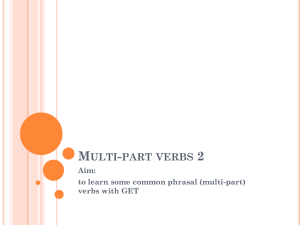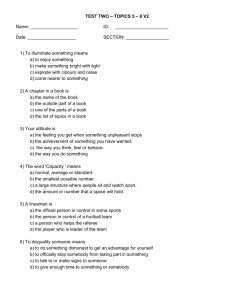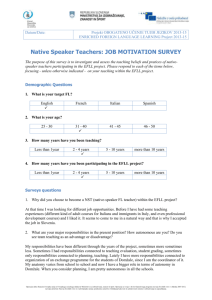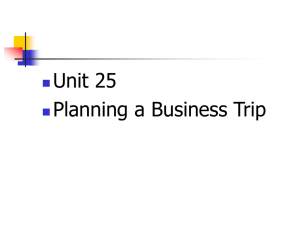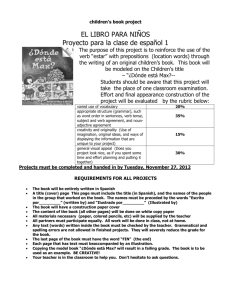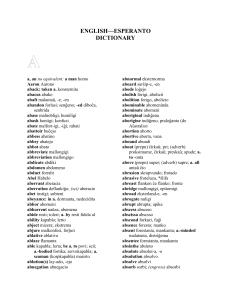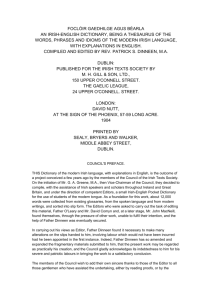MULTI-WORD VERBS 01
advertisement
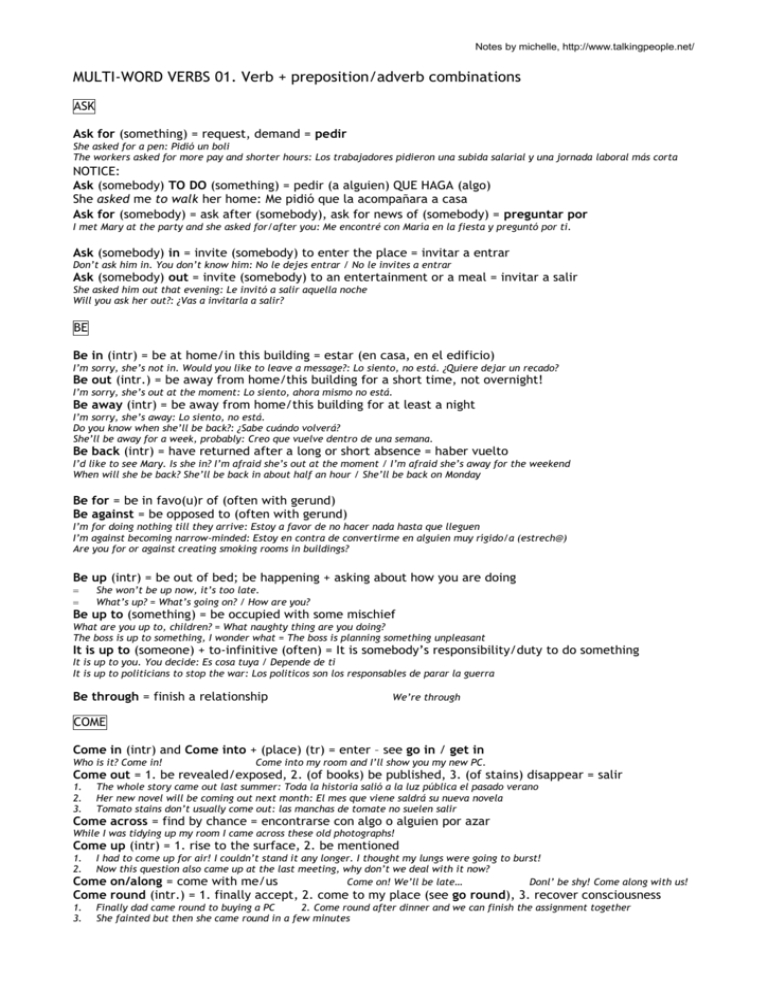
Notes by michelle, http://www.talkingpeople.net/ MULTI-WORD VERBS 01. Verb + preposition/adverb combinations ASK Ask for (something) = request, demand = pedir She asked for a pen: Pidió un boli The workers asked for more pay and shorter hours: Los trabajadores pidieron una subida salarial y una jornada laboral más corta NOTICE: Ask (somebody) TO DO (something) = pedir (a alguien) QUE HAGA (algo) She asked me to walk her home: Me pidió que la acompañara a casa Ask for (somebody) = ask after (somebody), ask for news of (somebody) = preguntar por I met Mary at the party and she asked for/after you: Me encontré con María en la fiesta y preguntó por ti. Ask (somebody) in = invite (somebody) to enter the place = invitar a entrar Don’t ask him in. You don’t know him: No le dejes entrar / No le invites a entrar Ask (somebody) out = invite (somebody) to an entertainment or a meal = invitar a salir She asked him out that evening: Le invitó a salir aquella noche Will you ask her out?: ¿Vas a invitarla a salir? BE Be in (intr) = be at home/in this building = estar (en casa, en el edificio) I’m sorry, she’s not in. Would you like to leave a message?: Lo siento, no está. ¿Quiere dejar un recado? Be out (intr.) = be away from home/this building for a short time, not overnight! I’m sorry, she’s out at the moment: Lo siento, ahora mismo no está. Be away (intr) = be away from home/this building for at least a night I’m sorry, she’s away: Lo siento, no está. Do you know when she’ll be back?: ¿Sabe cuándo volverá? She’ll be away for a week, probably: Creo que vuelve dentro de una semana. Be back (intr) = have returned after a long or short absence = haber vuelto I’d like to see Mary. Is she in? I’m afraid she’s out at the moment / I’m afraid she’s away for the weekend When will she be back? She’ll be back in about half an hour / She’ll be back on Monday Be for = be in favo(u)r of (often with gerund) Be against = be opposed to (often with gerund) I’m for doing nothing till they arrive: Estoy a favor de no hacer nada hasta que lleguen I’m against becoming narrow-minded: Estoy en contra de convertirme en alguien muy rígido/a (estrech@) Are you for or against creating smoking rooms in buildings? Be up (intr) = be out of bed; be happening + asking about how you are doing She won’t be up now, it’s too late. What’s up? = What’s going on? / How are you? Be up to (something) = be occupied with some mischief What are you up to, children? = What naughty thing are you doing? The boss is up to something, I wonder what = The boss is planning something unpleasant It is up to (someone) + to-infinitive (often) = It is somebody’s responsibility/duty to do something It is up to you. You decide: Es cosa tuya / Depende de ti It is up to politicians to stop the war: Los politicos son los responsables de parar la guerra Be through = finish a relationship We’re through COME Come in (intr) and Come into + (place) (tr) = enter – see go in / get in Who is it? Come in! Come into my room and I’ll show you my new PC. Come out = 1. be revealed/exposed, 2. (of books) be published, 3. (of stains) disappear = salir 1. 2. 3. The whole story came out last summer: Toda la historia salió a la luz pública el pasado verano Her new novel will be coming out next month: El mes que viene saldrá su nueva novela Tomato stains don’t usually come out: las manchas de tomate no suelen salir Come across = find by chance = encontrarse con algo o alguien por azar While I was tidying up my room I came across these old photographs! Come up (intr) = 1. rise to the surface, 2. be mentioned 1. 2. I had to come up for air! I couldn’t stand it any longer. I thought my lungs were going to burst! Now this question also came up at the last meeting, why don’t we deal with it now? Come on/along = come with me/us Come on! We’ll be late… Donl’ be shy! Come along with us! Come round (intr.) = 1. finally accept, 2. come to my place (see go round), 3. recover consciousness 1. 3. Finally dad came round to buying a PC 2. Come round after dinner and we can finish the assignment together She fainted but then she came round in a few minutes Notes by michelle, http://www.talkingpeople.net/ DO Do away with (tr) = abolish, throw out, get rid of The government should do away with the new law on education We should do away with nuclear weapons We’ll have to do away with poverty Do up (tr) = redecorate We’ll have to do this room up—the walls are filthy and the furniture is falling to pieces! Do without (tr) = manage in the absence of somebody or something = go without We can do without the sugar, but we can’t possibly do without the milk! If Peter is not here, we’ll have to do without him, really. GET AND GO Get back = 1. recover possession of, 2. reach home again = ser devuelto, volver a casa 1. 2. I want to get my records back. I really do… What time do you get back from work? Get in/out = enter/leave (an enclosed place) or escape from – see come in and go in Come on, get out of the car! (rude) Get in, quickly! Get into the fucking car! Get Get Get Get They died in the fire because they couldn’t get out of the building up = get out of bed; rise, mount I hate getting up early down = get depressed Switch off the telly. It gets me down away (intr) = escape, be free to leave I had a lot of work to do so I didn’t get away till seven through = 1. get into telephone communication, 2. communicate I’m trying to call London but I can’t get through. All lines seem to be engaged I can’t get through to you! What are we going to do now? Get over = recover from (illness, distress, mental or physical weakness) They’re getting over their parents death / You must get over it, come on I’m getting over the flu, so I’d rather not go out yet Get it over = deal with it and finish with it If you need to go to the dentist, why don’t you just go and get it over? Get away with (tr) = perform some illegal/wrong act without being punished, without even being caught! How Did I Get Away With Killing One Of The Biggest Lawyers In The State? It Was Easy (this is the title of a short story by Alice Walker, which we will be reading in class) You won’t get away with that! They are going to realize a printer cartridge is missing!!! Get on (intr), get on with (tr) = 1. make progress, be successful, 2. live, work, relate amicably with sb 1. 2. How are you getting on with your English? My little sisters gets on (well) with everybody! / How are you getting on with your partner? Go ahead = proceed, continue, lead the way Go away = leave, leave me/this place Go back = return, retire, retreat Go ahead, don’t wait for me! Are you going away on vacation/holiday? Go away! I can’t concentrate! I’m never going back to that place, it was horrible! Go back to page 27, will you? I forgot to explain something Prices always go up and never go down Go up/down = rise/drop Go on = 1. continue; also + gerund, 2. proceed, move to another point + infinitive, 3. be happening 1. 2. 3. Go Go Go on till you reach the traffic lights / Go on playing, please, I love that tune! He began by describing the route and went on to tell us what the trip would probably cost What’s going on here? for = attack, seek to achieve The man went for us because we refused to give him a kiss! for it! If you really want something, you have to go for it with all your strength. Go in cf. come in, get in Notice: Go into = investigate thoroughly Let’s go in. It’s getting dark /Go into that room and get my glasses, please Cf Get in, quickly! Get into the fucking car! Go out cf. come out, get out He went out of the house Will you go out with me? cf He got out of the house/c ar She doesn’t go out much Then the lights went out and we freaked out! Go over (tr) = examine, study or repeat carefully – see go into We’ll have to go over this financial report. There must be a mistake somewhere. Go through (tr) = examine carefully, usually a number of things (more thorough than look through) We’ll have to go through these papers and see if we find that document you’re looking for We’ll have to go through the accounts and see where the mistake is. Go without (tr) = do without Go round cf come round (to somebody’s house) I’ll go round to your house at about six, if that’s all right Notes by michelle, http://www.talkingpeople.net/ Practice. Translate: ¿Podrías pedir un boli, porfa? Dile que pase Invítale a salir Siempre pregunta por ti A--¿Podría hablar con la Sra García? B—Espere un momento. ... Lo siento, no está. A--¿Ha salido un momento o está de viaje? B—Ha salido un momento. A--¿Cuándo volverá? B—Dentro de media hora, más o menos. ¿Quiere dejarle un recado? A—Sí, si es tan amable. ¿Podría decirle que ha llamado el Sr Schneider? B—Claro. Disculpe, ¿cómo se escribe su nombre? A—No se preocupe. S-C-... B--¿Me da su teléfono? A—Es un número de Alemania. El prefijo de la ciudad es ... y el número es ... B—Muchas gracias. Oh, vaya, acaba de llegar! Espere un momento, por favor. Le paso (put through)

